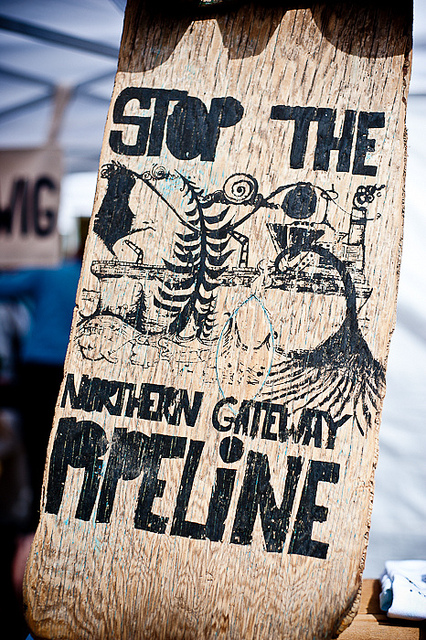Please help rabble.ca stop Harper’s election fraud plan. Become a monthly supporter.
The Harper government must announce its decision on the 525,000 barrels per day Northern Gateway tar sands export pipeline by midnight today.
On CTV’s Question Period this week, Grand Chief Stewart Phillip, president of the Union of British Columbia Indian Chiefs, said, “We fully expected the Harper government to make every effort to ram this project through. But…there’s enormous solidarity here in British Columbia between First Nations people, British Columbians, Canadians, and we’ll do what’s necessary and whatever it takes to stop this project.”
Even if the Harper government approves the pipeline today, a range of strategies are being proposed to ensure the pipeline is never built:
1. Blockade
The Unist’ot’en clan of the Wet’suwet’en people have set up a resistance camp on their traditional and unceded territory on the pathway of the pipeline. With the support of allies they are building and living in homes and structures to block the pipeline. Given the mountainous terrain of the area south of Houston in northern British Columbia, the pipeline cannot be rerouted to avoid the Unist’ot’en camp.
2. Court challenges
Five challenges against the pipeline have already been filed in federal courts, and it’s expected that number could increase to about a dozen. The primary arguments are that the review panel failed to meet its legal obligation by consulting sufficiently with First Nations whose territories are on the pipeline route, and that by not considering the evidence of the impacts of an oil spill the panel erred in its finding that the pipeline would not have a “significant adverse environmental effect.”
3. Civil disobedience
The British Columbia Civil Liberties Association is holding workshops to instruct people on their rights in protests against the pipeline. At the request of local groups, workshops have already been offered in the northern communities of Kitimat, Prince Rupert, Smithers, Skedigate, Masset and Hazelton. Grand Chief Phillip has said that, “There is no question [that protesters would block bulldozers].”
4. Referendum
The Dogwood Initiative is preparing to use provincial legislation that would allow a bill prohibiting the pipeline to be proposed if they can collect signatures from 10 per cent of the registered voters in each of the province’s 85 ridings. If approved to go to a public vote, and more than half of the voters cast ballots in support, the government must then introduce the bill in the legislature. This is how the harmonized sales tax measure was defeated in the province.
5. Defeat Conservative MPs
Forest Ethics Advocacy and Leadnow have launched their “Enbridge 21” campaign urging people to contact the 21 Conservative Members of Parliament in British Columbia to tell them they will “pay a political price” if their government approves the pipeline.
There undoubtedly be countless other ways the people will mobilize to ensure that this pipeline does not happen.
It is expected that the pipeline would take three years to build, meaning it could be operational by June 2017. But given the strategies noted above could delay construction of the pipeline for many years, Northern Gateway has been described as likely the first pipeline to be approved, but the last that would be built.
Photo: Caelie_Frampton/flickr




